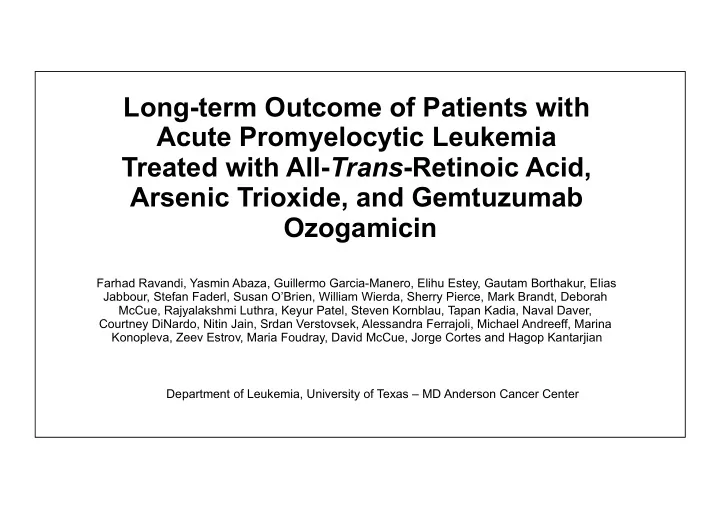

Long-term Outcome of Patients with Acute Promyelocytic Leukemia Treated with All- Trans -Retinoic Acid, Arsenic Trioxide, and Gemtuzumab Ozogamicin Farhad Ravandi, Yasmin Abaza, Guillermo Garcia-Manero, Elihu Estey, Gautam Borthakur, Elias Jabbour, Stefan Faderl, Susan O’Brien, William Wierda, Sherry Pierce, Mark Brandt, Deborah McCue, Rajyalakshmi Luthra, Keyur Patel, Steven Kornblau, Tapan Kadia, Naval Daver, Courtney DiNardo, Nitin Jain, Srdan Verstovsek, Alessandra Ferrajoli, Michael Andreeff, Marina Konopleva, Zeev Estrov, Maria Foudray, David McCue, Jorge Cortes and Hagop Kantarjian Department of Leukemia, University of Texas – MD Anderson Cancer Center
ATRA + ATO – GIMEMA, AMLSG, SAL Lo-Coco F et al. N Engl J Med 2013;369:111-121.
ATRA + ATO: Outcomes . Lo-Coco F et al. N Engl J Med 2013;369:111-121.
ATRA + ATO: Long-Term Follow-up. Platzbecker U, et al JCO 2017, 35, 605-612
ATRA + ATO: UK NCRI Burnett AK, et al, Lancet Oncology, 2015, 16(13), 1295-1305
ATRA + ATO ± GO: MDACC • Between July 2002 and May 2015, 239 patients with newly diagnosed APL seen at MDACC • Three phase 2 studies : ID01-014, NCT01409161, NCT00413166 • 187 patients enrolled • Reasons for excluding remaining 52 (22%) • Insurance/Socio-economic • Death within 48 hors of hospitalization
ATRA + ATO ± GO: Treatment Regimen Abaza Y, et al. Blood 2017;129:1275-1283
ATRA + ATO ± GO: Patient Disposition Abaza Y, et al. Blood 2017;129:1275-1283
Patient Characteristics Characteristics (N = 187) Number (%) Median (range) Age, y 50 (14-84) ≥ 60 52 (28) Sex Male • 97 (52) Risk category High-risk 54 (29) Low-risk 133 (71) Leukocyte count ( × 10 9 /L) 2.2 (0.3-187.9) Platelet count ( × 10 9 /L) 36 (3-261) Cytogenetics t(15;17) 122 (65) t(15;17) + other cytogenetic 45 (24) Diploid (RT-PCR +) 10 (5) ND/IM (RT-PCR + ) 10 (5) FAB morphology M3 163 (87) M3v 22 (12) PML-RARA isoforms Short 78 (42) Long 105 (56) Both 4 (2)
Mutation Analysis Molecular Performed Detected High Risk Standard Feature N N(%) N(%) Risk N(%) PML-RARA 187 187 FLT3-ITD 152 59 (39) (66) (28) FLT3-TKD 153 18 (12) (13) (11) RAS 145 7 (5) (2) (6) CEBPA 39 1 (3) Abaza Y, et al. Blood 2017;129:1275-1283
Details of Leucocytosis and Cytoreductive Therapy • 179 patients (96%) achieved CR after induction (Low risk 96%, high risk 96%) • 176 achieved complete molecular remission (2 withdrew consent; 1 lost to f/u) • 53 High risk patients received cytoreductive therapy; • 45 (83%) received GO, • 7 (13%) received Idarubicin, • 1 (2%) received both and • 1 did not receive any • 96 Low risk patients (72%) developed leukocytosis • Median WBC 19.8 x 10 9 /L, range 10.3-195 x 10 9 /L • reached at a median of 10 days (range 2- 26 days) • Among them 60 received cytoreductive therapy • GO in 51, Idarubicin in 9 • No patients received GO for molecular persistence or relapse
Survival outcomes for the whole population Median F/U 47.6 months, Range 2.7 – 159.7 months Abaza Y, et al. Blood 2017;129:1275-1283
Outcomes by risk subsets Abaza Y, et al. Blood 2017;129:1275-1283
Outcomes by age Abaza Y, et al. Blood 2017;129:1275-1283
Survival for specified subsets Abaza Y, et al. Blood 2017;129:1275-1283
Characteristics of Relapsed Patients 7 patients relapsed including 3 with CNS relapse Time to first Type of first Patient no. Risk category Age (y) Sex Cytogenetics FLT3 status relapse (mo) relapse 1 High 52 F Diploid ND 9.2 Molecular * Hematological/ 2 Low 42 M 46XY t(15;17) [20] ND 79.5 molecular Hematological/ 3 High 38 M 46XY t(15;17) [19] ND 9 molecular 46XY t(15;17), der (17) i 4 High 79 M Neg 12.4 Molecular * (17) (q10) [18]; 46 XY [2] 5 High 18 M 46XY t(15;17) [19] ND 9.4 Molecular * 6 Low 19 F Diploid Neg 9.5 Hematological 46XY t(15;17) [16]; 46 7 High 35 M Neg 7.9 Hematological idem, del 7 [1]; 46 XY [3] Abaza Y, et al. Blood 2017;129:1275-1283
Causes of Death • 26 (14%) patients died: • 7 during induction, 2 refractory relapse, and 17 died in CR Response at time of Patient (N = 17) Age (y) CR duration (mo) Cause of death death 1 69 69.9 Stage IV GIST CR 2 77 8 Prostate cancer CR 3 75 60 Prostate cancer CR 4 60 96.2 H&N cancer CR 5 47 4.9 Prostate cancer CR 6 64 77.5 Melanoma CR 7 74 73.4 Pancreatic cancer CR 8 70 16.5 Melanoma CR 9 69 58.4 ESRD on HD CR 10 75 15.7 ESRD on HD CR Pneumococcal 11 38 9 CR meningitis 12 64 0.9 Sepsis/pneumonia CR Infection and pulmonary 13 21 9.3 CR embolism 14 69 7 CHF and cardiac arrest CR 15 81 25.2 Unknown CR 16 81 106.8 Unknown CR 17 43 39.2 Unknown CR Abaza Y, et al. Blood 2017;129:1275-1283
Grade 3-4 adverse events Toxicity N (%) Infections 44 (23.5) QT prolongation 14 (7.5) Hemorrhage 10 (5) Hepatotoxicity 27 (14) Differentiation syndrome occurred in 21 patients (11%); managed successfully in all Abaza Y, et al. Blood 2017;129:1275-1283
Conclusions • ATRA plus ATO is effective in frontline therapy of standard risk APL • Addition of GO in high risk patients and in low risk patients whose WBC rises is safe • Excellent outcome in high risk patients • No incidence of veno-occlusive disease of liver • No significant cardiac arrhythmias with careful monitoring and replacement of electrolytes • Most failures after the initial period related to death from other causes • Few late relapses after first year
Recommend
More recommend